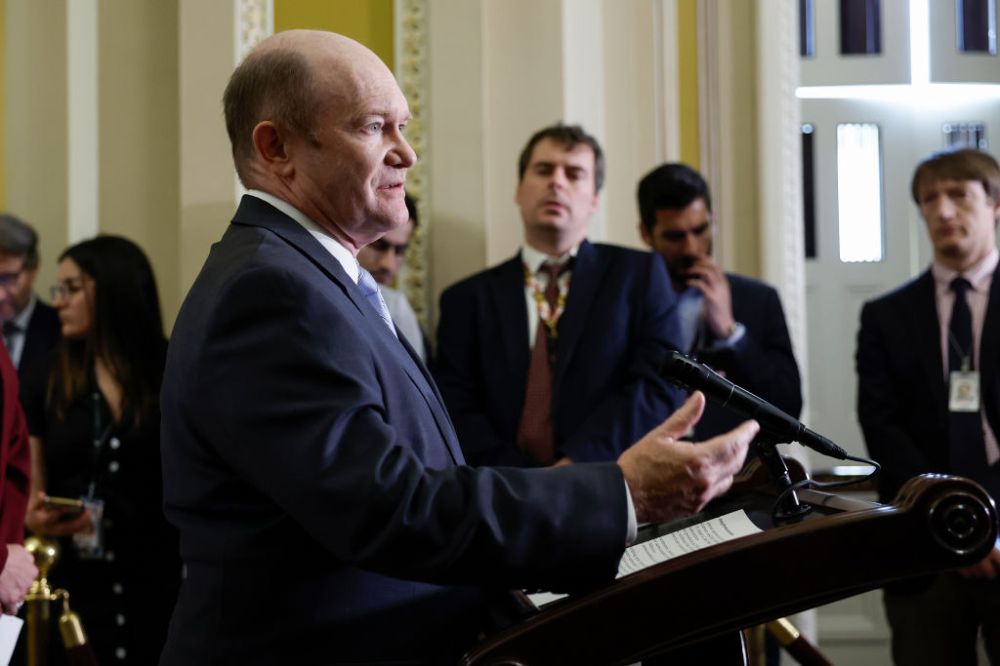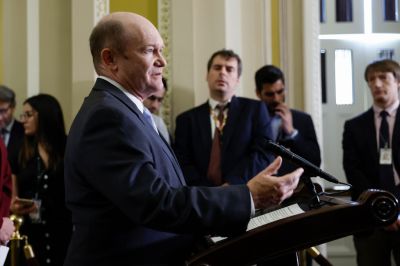When President Joe Biden signed off last week on sending cluster munitions to Ukraine, he received pushback from some members of Congress who worried about the threats the weapons pose to civilians. But the resistance has been limited. Senators returning to Washington this week found themselves in a familiar stance: expressing bipartisan support for the White House’s latest Ukraine decision.
“It is the right thing to do,” South Dakota Republican Sen. Mike Rounds tells The Dispatch. It “definitely has the possibility of changing or improving” Ukraine’s war capabilities, he adds.
Just as the Senate’s position on NATO membership for Finland and Sweden hasn’t meaningfully changed since it passed accession protocols for both countries by a vote of 95-1 in August, the upper chamber has been consistent when it comes to approving new weapons for Ukraine. Hawkish lawmakers may chide the president for failing to use his authority more aggressively, but they are generally supportive when he does decide to act.
And those who disagree with the administration’s decision—such as Democratic Sens. Tim Kaine and Ben Cardin—can do little besides express disapproval. The security assistance package that includes the munitions comes from the president’s drawdown authority, which was established by Congress in the Foreign Assistance Act of 1961 and allows for transfers of Pentagon weapons stocks in crisis situations.
Many American allies are signatories to the 2008 Convention on Cluster Munitions, but the U.S. isn’t. U.S. policy regulating the use and distribution of cluster munitions has come from a combination of executive and legislative action. In 2008, the Bush administration issued a directive requiring the U.S. to eliminate almost all of its cluster munition stockpiles by 2018—a policy that was replaced in 2017 as the Trump administration sought to keep older, less reliable weapons on hand in the absence of better alternatives.
In addition to the 2008 Pentagon rule, which was maintained throughout the Obama administration, Congress decided as part of a 2009 omnibus bill to ban the export of cluster munitions with a failure rate of more than 1 percent (meaning “dud” bomblets that didn’t explode on contact but can still be dangerous). Now, Biden is invoking the Foreign Assistance Act to skirt that 2009 limit. The cluster munitions used by the United States have a dud rate of less than 2.5 percent, National Security Adviser Jake Sullivan said in a White House briefing Friday.
“I’ve always opposed the use of cluster bombs,” Cardin told reporters Monday. “I have serious concerns with what the president is doing.”
But many senators applauded the decision. Delaware Democrat Sen. Chris Coons argues it was a tough but necessary call. And Rounds notes that the munitions the administration is sending have a much lower failure rate than the Soviet-era ones Russia is already using. Those weapons fail to explode 30 to 40 percent of the time, creating long-lasting safety risks for civilians.
“I think it’s only right that Ukraine should be able to use them, particularly to defend your own homeland against unwarranted aggression by an enemy, and for that matter, it could bring a quicker end to the war,” North Dakota Sen. Kevin Cramer says. If they bring about a quick end, that “would be ultimately more humanitarian than not using it.”
Meanwhile a bipartisan delegation of six senators are with Biden at the NATO summit in Vilnius, Lithuania, as questions swirl about the alliance’s current and future membership. Approving Finland and Sweden’s accession to NATO was a no-brainer for the Senate and the president last year. But there is little consensus on the possibility of Ukraine becoming a member in the near future.
The alliance agreed 15 years ago that Ukraine eventually “will become” a member of NATO. But it hasn’t followed through, wary of antagonizing Russia.
South Carolina GOP Sen. Lindsey Graham tweeted last week that he is working with both parties to “pass a resolution urging the admission of Ukraine into NATO.” And Democratic Sen. Richard Blumental says he would be interested in something along those lines: “We want to indicate that there is strong support for admitting Ukraine to NATO.”
While there may be bipartisan support for Ukraine joining the club eventually, that day is a long way off. Because Article 5 provides that an attack on one NATO member is an attack on all, welcoming Ukraine into the fold could mean dragging American and other NATO troops into the war. The president and senators from both parties insist that the war must end before Ukrainian membership in NATO becomes a serious possibility.
“We certainly look forward to that day,” Cardin says. But first, “we’ve got to end the war. We’ve got to win the war.”
On the Floor
The House will likely consider the National Defense Authorization Act (NDAA) this week; the Rules Committee meets today to consider what amendments they will allow to be considered on the floor. A full list of the bills the House will consider is available here.
The Senate will consider various nominations this week, including Biden’s latest picks for the Federal Reserve. You can keep up with floor activity through the week here.
Key Hearings
- The Senate Homeland Security and Governmental Affairs Committee will hold a hearing Tuesday morning on the PGA-LIV deal and its implications “for the future of golf and Saudi Arabia’s influence in the United States.” PGA tour executives Ron Price and Jimmy Dunne will testify. Information is available here.
- FBI Director Christopher Wray is set to appear before the House Judiciary Committee Wednesday for an oversight hearing on the “politicization of the nation’s preeminent law enforcement agency.” Information and livestream here.
- Federal Trade Commission Chair Lina Khan will appear before the House Judiciary Committee for an oversight hearing on the FTC that will examine “mismanagement of the FTC and its disregard for ethics and congressional oversight.” Information and livestream here.
- The Senate Subcommittee on Taxation and IRS Oversight will hold a hearing Thursday morning on “assessing 25 years of the Child Tax Credit.” Information and livestream here.
- The House Select Committee on the Chinese Communist Party will hold a hearing Thursday evening examining the “growing peril for American companies in China.” Information and livestream here.





Please note that we at The Dispatch hold ourselves, our work, and our commenters to a higher standard than other places on the internet. We welcome comments that foster genuine debate or discussion—including comments critical of us or our work—but responses that include ad hominem attacks on fellow Dispatch members or are intended to stoke fear and anger may be moderated.
With your membership, you only have the ability to comment on The Morning Dispatch articles. Consider upgrading to join the conversation everywhere.